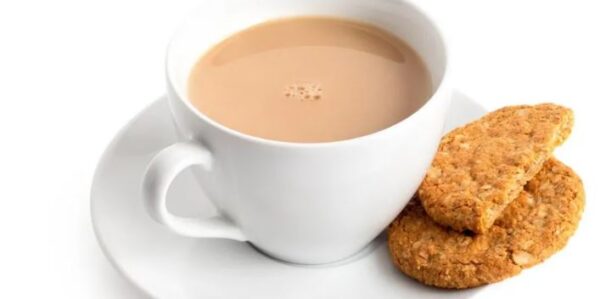
The pair of tea and biscuits has been one of the favourite daily habits for millions of people all over the world.
Whether it’s in the morning or mid-afternoon, dunking biscuits in tea is a soothing habit for most people.
The good thing about this pairing is that no one feels bad at all, or at least it would be enjoyable. But the sad thing is that regular consumption might harbour unhealthy consequences.
Tea and biscuits, especially with sugar and unhealthy fats, might be the origin of several diseases in the long term.
Here’s all you need to know about it.
1. High sugar content in biscuits
Most biscuits, including the more commercial ones, are filled with refined sugar. When you eat them as you take your tea, there results in a substantial increase in blood sugar levels. It also raises the chances of developing Type 2 diabetes contributes to weight gain and makes one have low-energy levels. The sharp increase in blood sugar is usually associated with a sharp crash afterward, which makes you feel tired and want to have more sugar again shortly after.
2. Empty calories
Biscuits are usually made from white flour and sugar and provide no nutritional content. They represent so-called ‘empty calories’ that tend to lead to weight gain without being represented in the dietary table of vitamins, minerals, or fibre. When served with tea and taken habitually, these biscuits will only encourage overeating due to their inability to fill you up or satisfy hunger. Over time, this may mean inappropriate weight gain and other health issues associated with it.
3. Trans fats and bad oils
Most of the ready-made biscuits contain trans fats and hydrogenated oils, which harm the health interest of your heart. Such fats raise the LDL levels of your blood while reducing the HDL levels; this causes several heart diseases and even a stroke. Continuous consumption of biscuits containing these bad fats may result in some severe cardiovascular problems, though ingested in small quantities.
4. Acidity and digestive issues
Tea contains tannins, which will increase the stomach acidity. Drinking tea with carbohydrate-rich biscuits that are high in sugar and refined flour may make digestive issues such as acid reflux, bloating, and indigestion worse. Along the way, people regularly consuming such high-carb, sugary biscuits to pair with their tea had an imbalance in the stomach acids, making digestion more difficult and causing aches and pains.
5. Malabsorption
An excessive intake of tea may interfere with the absorption of minerals like iron and calcium. Tea contains tannins that can bind these minerals, and consequently, the body is not able to absorb enough of them, leading to a deficiency over time. Drinking tea with rich sugar biscuits may combine to prompt unhealthy eating behaviours in which nutrient provision foods are avoided.
6. Mindless overeating
Together with tea, biscuits trigger an automatic snacking response. Drinking tea is often related to social events or unwinding, and in these occasions the person tends to grab biscuits without attention to the number of biscuits they are consuming. Since the biscuits do not provide long-term satiety, it becomes easy to overconsume the biscuits accompanying additional calories, sugar, and unhealthy fats.
7. Blood sugar crashes
Biscuits contain a lot of refined sugars and carbohydrates that the body easily absorbs, causing the sugar to shoot up in the blood levels. When this high wears out, it calls for a crash, making one feel tired, cranky, and still with the hankering for more sugar. This pattern may manifest into bad eating cycles that make it challenging to stabilise your energy levels or maintain a balanced diet.
8. Oral health problems
Biscuits are sticky in nature and clingy to the teeth, and when combined with the sugar content in tea, it pose a danger to the development of tooth decay and other dental issues. The sugars from both the tea and the biscuits feed the harmful bacteria lurking in the mouth, which lead to plaque formation, cavities, and gum diseases. Consumers of this module tend to contribute to long-term dental problems.
Healthier alternatives over tea and biscuits
While tea and a biscuit is an old combination that comes back to remind most of yesteryear’s, here are some much healthier alternatives to enjoy your break time at the office or elsewhere…
Nuts and seeds: There’s no better match for breaking your tea than stuffing in some nuts and seeds, which are chock-full of healthy fats, fibre, and protein.
Fresh fruit: Slice a fresh fruit like an apple, banana, or berries, serving natural sweetness in nutrients but without the added sugar and unhealthy fats that come with biscuits.
Whole-grain crackers: Use whole-grain crackers instead of biscuits for the provision of fibre and sustained energy.
Homemade snacks: Homemade is the way to go if you love biscuits. Make healthier versions at home, using whole grains, honey, or ghee as natural sweeteners, and healthy fats from coconut oil.
While tea and biscuits are on the list of seemingly less harmful indulgences compared to all the other treats, frequent intake won’t be any good for your health. These can cause blood sugar fluctuations and problems with your digestive system when you take in regularly. Instead, choose healthier snack options together with your tea, such as fresh fruit or nuts, and enjoy your tea while keeping better overall health.

















